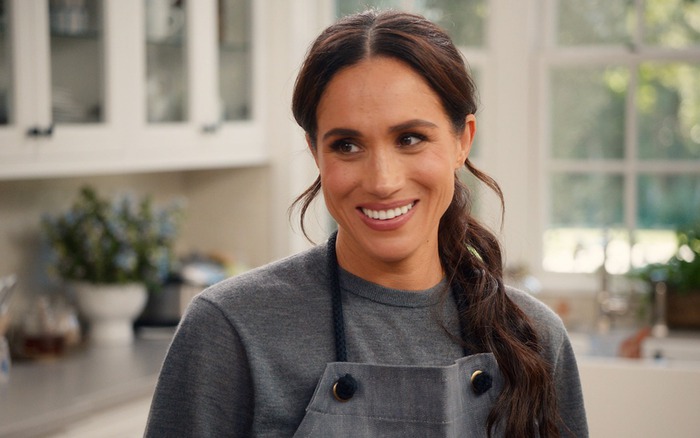Meghan Markle is back—and this time, she’s got a jam jar, a pastel filter, and a catchphrase she’s apparently trying to trademark. If that sounds like a parody, it’s not. In a two-week lead-up to the debut of her new Netflix show With Love, Meghan, the Duchess of Sussex dropped a video that was supposed to scream “authenticity” but instead launched a thousand TikToks mocking every awkward moment, forced line, and fruit platter arrangement.

The announcement was supposedly casual—Harry hands Meghan a phone, she hits record, and she delivers her not-so-spontaneous monologue about launching her business alongside her Netflix series. The company, now dubbed As Ever, is meant to be her new lifestyle brand and, of course, includes her beloved jam. But Meghan being Meghan, it doesn’t stop there.
She claimed she secured the name As Ever back in 2022, though legally, the trademark is still pending. Despite the application’s limbo status, Meghan is forging ahead—rebranding her previous attempt American Riviera Orchard to As Ever, saying the former was too geographically restrictive. Funny, considering Montecito farmers have said they know nothing about the supposed products she claims are grown locally.
But the real drama is the name itself. “As Ever” isn’t a revolutionary phrase—just ask any basic English speaker. Yet Meghan seems determined to make it her signature. Never mind that a small NYC business already exists under that name and is now terrified her legal team will steamroll them. Never mind that she appears to have stolen their logo—a coat of arms from a small Spanish town—and stripped it of life, much like the critics say she does with every brand she touches.

And never mind that Princess Diana may have once used the phrase “as ever,” a fact that fuels further speculation Meghan is once again trying to live out her fantasy as the next People’s Princess. Critics aren’t buying it. They accuse her of launching a brand rooted more in nostalgia and narcissism than originality. Three separate trademark applications for As Ever have already been filed, but nothing is approved. Meanwhile, she’s banned from using the brand for clothing due to a Chinese company named “AS,” which supplies to H&M. So much for that product line.
But Meghan’s performative “soft launch” doesn’t stop at logos and jam jars. With Love, Meghan tries to position her as a relatable, down-to-earth mom who lovingly makes fruit rainbows and skillet noodles while her kids come home from school to the sweet smell of homemade preserves. It’s an image she pushes hard—but too hard. Each line seems calculated, every moment curated. Whether she’s awkwardly flipping crepes or pretending that making a single row of fruit is somehow revolutionary, it all reads like a try-hard influencer skit from 2015.
The show is packed with attempts to show Meghan as a warm, domestic goddess. But viewers weren’t buying it. When a friend compliments her vegetable platter, asking how long it took, the internet collectively rolled its eyes. Critics pointed out: every parent has tried to make food fun for their kids. It’s not original, it’s not compelling—and it’s certainly not a brand.
There’s also the identity confusion. In one viral clip, she lashes out after someone refers to her as Meghan Markle. “I’m Sussex now,” she insists.

This is despite never using Sussex as a surname before—not during her Oprah interview, Netflix docuseries, or even in official branding. And her kids? They go by Mountbatten-Windsor. It’s a baffling rebrand that contradicts everything she’s said about losing her identity in the royal family.
Then comes the cringe: Meghan’s faux humility, stories of calling her own hair stylist back in her Suits days, her attempt to make Beyoncé’s “Cozy” sound like a lullaby rather than a song about Black empowerment. It all rings hollow.
The show’s peak absurdity arrives when Meghan comments on her children’s eating habits, nervously clarifying, “Not that my children are eating heaps of noodles,” as if the mom police might arrest her for serving carbs. This constant self-defense reveals a deep insecurity: every moment of motherhood is being marketed, every detail a brand opportunity.
And just when you think she’s done, there’s the strategic social media play. She dropped behind-the-scenes footage the same day Prince William and Kate Middleton made their first joint appearance after Kate’s cancer announcement—then deleted it, only to repost later. Coincidence? Unlikely.
Ultimately, As Ever feels less like a lifestyle brand and more like a desperate bid to stay relevant. Meghan’s attempt to straddle authenticity, royalty, and influencer-dom exposes every crack in her curated image. In trying to be everything—mother, mogul, duchess, influencer—she ends up being none of them convincingly.